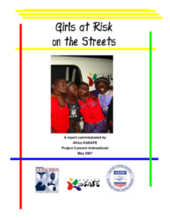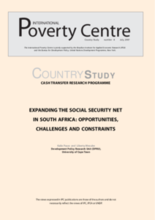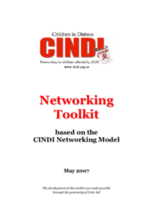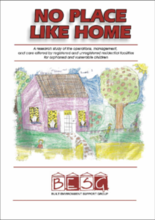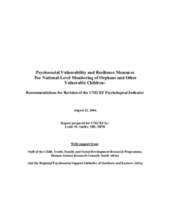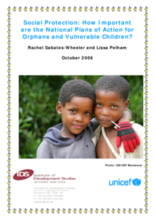childrens_living_arrangement
children_living_without_bio
Displaying 311 - 320 of 337
A report that identifies gaps and provides recommendations for protecting and supporting girls living on the streets. It provides models of good practices from Ghana, Kenya and Zimbabwe.
Examines constraints to expansion of the social welfare net in South Africa. Cites substitution taking place within the social budget since education and health expenditures have already declined in favour of increased welfare transfer expenditures.
Investigates the AIDS mitigation impacts of several large social cash transfer programmes in Africa. Emphasis on investigating non-specific targeting (of poor families) versus targeting specific to households affected by AIDS.
A networking lessons learned toolkit that examines CINDI, a successful children and HIV / AIDS network in South Africa.
A study of endogenous community-based responses to the needs of children affected by HIV and AIDS, and how these might be supported in KwaZulu-Natal.
A series of 14 Core Indicator Sets that can be used by stakeholders to monitor the situation of children in South Africa.
A study of the management, operations, and care offered by institutions for AIDS orphans in South Africa. It compares the findings of registered and unregistered institutions.
"According to the first stage of our research, there is no significant difference between children, based on their orphan status," Quinlan said. Orphaned children are doing as well in school and engaging in the same level of risk behavior as their non-orphaned counterparts.
This document discusses the work contributing to the area of psychosocial measurement with regard to HIV/AIDS and provides samples of surveys that can be used in measurement.
This briefing paper emerges from a review of 14 national plans of action (NPA), or in the absence of a NPA, outputs from the rapid assessment analysis and action planning (RAAAP) work for orphans and children made vulnerable by HIV/AIDS. The purpose is to analyse the way that issues of social protection are incorporated into these plans and to highlight areas within the plans where social protection activity may be needed to achieve stated outcomes. Annex 3 summarises, country by country, the social protection content of each NPA.

